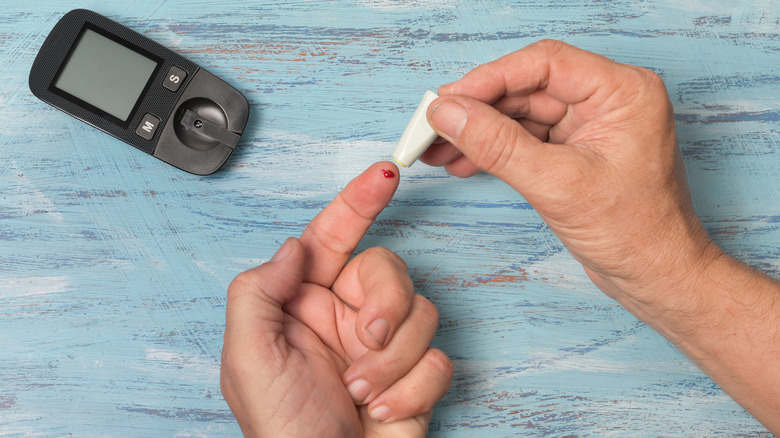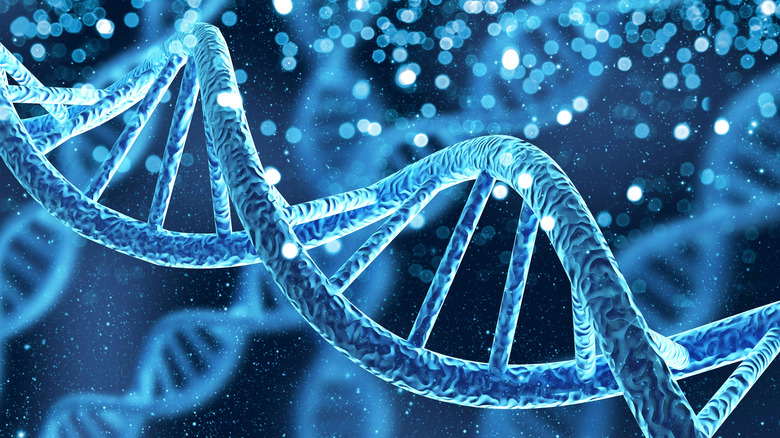Night Eating Syndrome Explained: Causes, Symptoms, And Treatments
Night eating syndrome (NES) is a lesser known eating disorder that's estimated to affect between 1.5% and 5.7% of the population (via The Anatolian Journal of Family Medicine). People with NES usually wake up in the middle of the night to eat or binge-eat, while others may consume a large amount of food after dinner before going to bed. This is usually accompanied by strong cravings, which tend to skyrocket late at night.
The condition tends to occur in people with obesity, according to research, although many people struggling with NES are of a normal weight (via Annals of the New York Academy of Sciences). NES often goes hand in hand with sleep disturbances and disorders like insomnia, and a large number of people are also battling depression.
NES was first described in 1955 in the American Journal of Medicine. A newly classified mental health disorder, it was included in the other specified feeding or eating disorder (OSFED) category of the DSM-5 for the first time in 2013 (via Nutrition & Diabetes). Although researchers have made huge progress in trying to understand the characteristics and causes of NES, many questions remain. Here are some science-backed insights into the symptoms, causes, and possible treatments for this complex eating disorder.
Night eating syndrome basics
People with NES consume a majority of their daily caloric intake after dinner (via the International Journal of Eating Disorders). Often, they get out of bed at night to eat or binge and tend to skip breakfast the next morning. Some people wake up a few times throughout the night with an intense desire to eat excessively, also known as hyperphagia. Individuals with NES have dysfunctional beliefs about eating — for instance, they may feel as though they won't fall or stay asleep unless they eat.
Other common symptoms of NES include anxiety, depression, or a low mood, particularly in the evenings (per International Journal of Eating Disorders). Due to the recurring and uncontrollable nature of nocturnal eating, people often experience feelings of profound shame, guilt, and helplessness.
Night eating behaviors can occur several times a week (via International Journal of Eating Disorders). But in order for an official diagnosis of NES to be made, individuals must be experiencing night eating at least twice a week and consuming 25% of their calories after dinner. Symptoms must be present for at least three months. Individuals must also be aware of their nightly episodes and able to recall them afterward. The disorder must trigger emotional distress, and on the more severe end of the spectrum, it might be interfering with a person's day-to-day life and functioning.
The difference between night eating syndrome and other eating disorders
It's been debated whether NES should be categorized as a standalone eating disorder. Some researchers argue that NES shares many features with binge eating disorder (BED) and should be recognized as a sub-category of it (via Surgery for Obesity and Related Diseases). However, there are some important differences between the disorders.
NES specifically affects people at night or sometime after dinner (via the Journal of Eating Disorders). People with BED tend to consume an abnormally large amount of food in one sitting, whereas those struggling with NES may sometimes eat small or normal-sized meals. Individuals with BED are also more likely to eat in the absence of hunger and worry about their weight and body shape compared to those with NES (per Surgery for Obesity and Related Diseases). Both eating disorders are associated with depression, but the relationship tends to be stronger in people with BED, who often have more distorted thoughts about eating and a sense of being out of control around food.
One of the main differences that sets NES apart from bulimia is that people with NES don't engage in compensatory behaviors, such as fasting, purging, or over-exercising to get rid of excess calories (via the Journal of Clinical Medicine). People with NES often skip breakfast but this is usually because they still feel full from eating the night before rather then as an intentional form of fasting, according to the Journal of Eating Disorders).
The difference between night eating syndrome and sleep-related eating disorders
NES differs from sleep-related eating disorder (SRED), according to the International Journal of Eating Disorders. The latter is a form of parasomnia, namely an abnormal behavior that occurs involuntarily while people are still asleep. They may get out of bed, go to the kitchen, prepare a meal, and eat or binge, without remembering any of it afterward. By contrast, people with NES are conscious of what they're doing. They're able to recount the details of what they did the next day, even if the behaviors may feel automatic and out of control.
SRED can be caused by certain medications like sedatives that help people sleep (via International Journal of Eating Disorders). It often coexists with other sleep disorders, such as restless legs syndrome, sleepwalking, obstructive sleep apnea, or insomnia. SRED also carries additional risks that may not affect people with NES. For example, it can result in accidents like cuts and burns, since individuals aren't aware of what they're doing. Some people may even consume inedible substances and objects that are hazardous or poisonous.
Research shows that both NES and SRED can lead to weight gain over time, increasing individuals' risk of type 2 diabetes and other health problems (via Hidden and Lesser-known Disordered Eating Behaviors in Medical and Psychiatric Conditions).
How NES is diagnosed
A doctor can assess you for NES by asking you a number of key questions (via the International Journal of Eating Disorders). A diagnosis can be made based on your current symptoms, the impact that they're having on your daily life, and how long they've been affecting you.
There are various assessment tools that clinicians can use to make a diagnosis of NES, a popular one being the Night Eating Questionnaire (NEQ), according to Eating Behaviors. This validated questionnaire contains a series of questions that are designed to measure NES symptom severity by assessing whether a person's behaviors and emotions are indicative of night eating syndrome.
Another widely used assessment method is the Night Eating Symptom History and Inventory (via Encyclopedia of Feeding and Eating Disorders). This is modeled on the NEQ and comes in the form of a semi-structured interview with a healthcare professional. It's used to measure the presence and frequency of NES symptoms.
Main health complications and risks
One of the main risks associated with NES is type 2 diabetes, according to a study published in the Journal of Eating Disorders. It's also been shown to significantly raise the risk of other metabolic complications like high blood pressure, elevated blood sugar levels, and insulin resistance, particularly in cases of rapid and unhealthy weight gain. Other health consequences include high cholesterol, cardiovascular issues, and gastrointestinal issues, notes Eating Disorder Hope.
Although people with NES tend to gain weight over time and generally struggle with weight problems, a person doesn't have to be overweight in order to meet the criteria for a diagnosis (via Annals of the New York Academy of Sciences).
People with NES are likely to grapple with other sleep problems too, reports a study published in Eating and Weight Disorders – Studies on Anorexia, Bulimia and Obesity. Waking up in the middle of the night to eat can affect a person's quality and quantity of sleep. The feeling of being full or having excess energy from eating too much can interrupt their sleep or cause them to go to bed later than normal. It might also mean they have poor or irregular sleep. The researchers point out that it's not entirely clear whether excessive eating is responsible for sleep disturbances or if hyperphagia is a response to a lack of sleep.
Co-existing conditions
It's not uncommon for people with NES to struggle with depressive symptoms. A 2022 study from the International Journal of Eating Disorders found that individuals who experienced episodes of night eating generally had higher levels of depression. Researchers are still trying to determine which condition causes which or if the relationship is bidirectional: Does NES make an individual more vulnerable to depression or do depressive symptoms lead to night eating as a coping mechanism and a form of self-medicating?
NES is significantly higher in patients diagnosed with major depression and other mental health conditions, such as anxiety, obsessive compulsive disorder, and personality disorders (via Archives of Neuropsychiatry). People with NES are also more likely to be habitual smokers, users of antipsychotic drugs, and have previously attempted suicide compared to others. The disorder frequently shows up in those who have been psychiatrically hospitalized.
Research shows that NES is also common in people with bipolar disorder and tends to worsen their anxiety and day-to-day functioning (via Sleep Medicine). Unsurprisingly, NES can chip away at a person's self-esteem, reinforcing feelings of low self-worth and shame (via Obesity Research).
Some possible causes
Like many illnesses, the precise underlying cause of NES is unknown. A possible culprit is said to be a dysfunctional circadian rhythm, namely your body's natural clock (via Physiological Research). A faulty circadian rhythm has been shown to disrupt an individual's sleep-wake cycle, playing havoc with the body's natural production of melatonin (the hormone that makes you feel sleepy) and cortisol (the hormone that wakes you up). Not getting enough sleep can result in lower levels of leptin and higher levels of ghrelin in your bloodstream in the morning, which are hormones that help regulate your appetite (via Nutrition & Diabetes). All of this can have a knock-on effect on a person's eating patterns.
Night eating might also be a response to stress (via Eating Disorder Hope). Some people may turn to food at night as a way to address their unmet emotional needs, also termed "emotional hunger" (via Appetite). Over time, this can lead to a dependency on food, and habitual night eating might become an automatic way to regulate and cope with difficult emotions.
Dieting could be another contributing factor to the development of NES, notes the Cleveland Clinic. Restricted food intake can lead to both psychological and physical deprivation, causing a person to overeat or binge later in the day.
Genes may play a role
Night eating may have a genetic basis, say researchers (via Cell Reports). Studies have discovered that some people may have a mutation in a gene called PER1 that causes them to wake up in the night with an insatiable hunger and desire to eat. The proteins PER1 and PER2 usually keep your body's natural sleep rhythms in sync with your daily eating patterns. When these genes work as they should, they enable you to experience hunger cues and eat at a consistent time every day. A mutation in one of these genes, on the other hand, breaks the communication between these systems, throwing them out of balance. So, NES may run in families.
The biobehavioral model of NES proposes that the disorder develops from a combination of factors: In particular, a genetic predisposition for the syndrome, when triggered by stress, can cause low levels of serotonin, sending both a person's circadian rhythms and appetite off-kilter (via Appetite).
Effective forms of treatment
As with most eating disorders, there's no single best way to treat NES (via Psychology Research and Behavior Management). Different therapeutic approaches work for different people. There's evidence that cognitive and behavioral treatment modalities can reduce NES symptoms, including behavioral therapy, phototherapy, behavioral weight loss treatment, and cognitive-behavioral therapy (CBT). Behavioral interventions often include meal planning, which can help people to establish consistent and structured eating habits.
CBT has been shown to be particularly effective (per Psychiatrist.com). A large part of this evidence-based intervention focuses on unlearning and reframing some of the unhelpful beliefs that people have about eating at night. There's also evidence that bright light therapy, also known as phototherapy, can help treat NES in some patients. This is often used to ease the symptoms of seasonal affective disorder (SAD), according to the Bulletin of Experimental Biology and Medicine. It does this by suppressing the body's production of melatonin (the hormone that promotes sleepiness) to help reset your internal clock so that you can fall asleep at the right time.
Other effective interventions for NES include progressive muscle relaxation and medication, such as selective serotonin reuptake inhibitors (SSRIs), notes a 2019 study published in Expert Review of Endocrinology & Metabolism. More research is needed to shed light on the etiology of this frequently misunderstood phenomenon and the different treatment approaches that could help prevent, reduce, and alleviate its symptoms.










